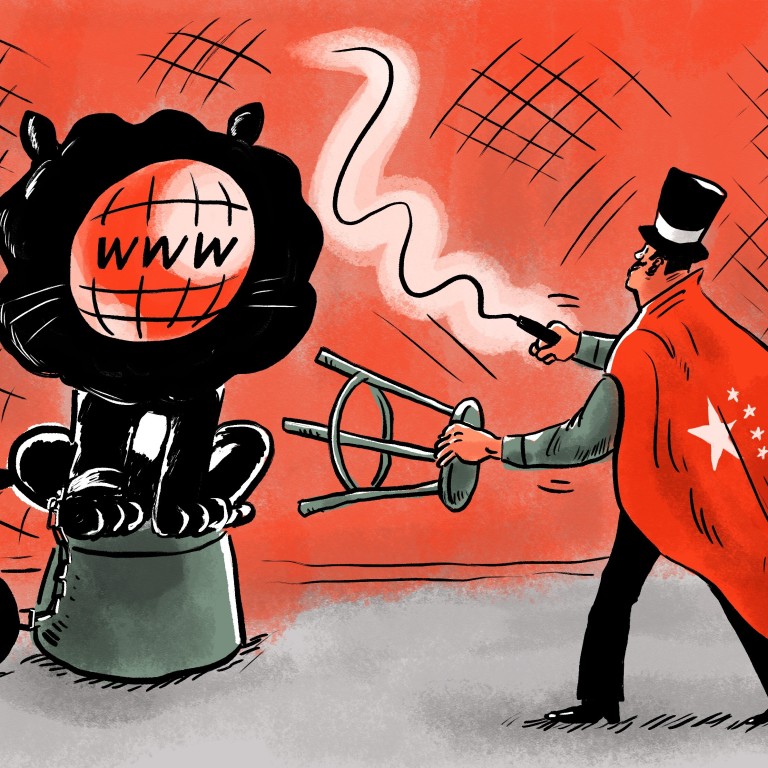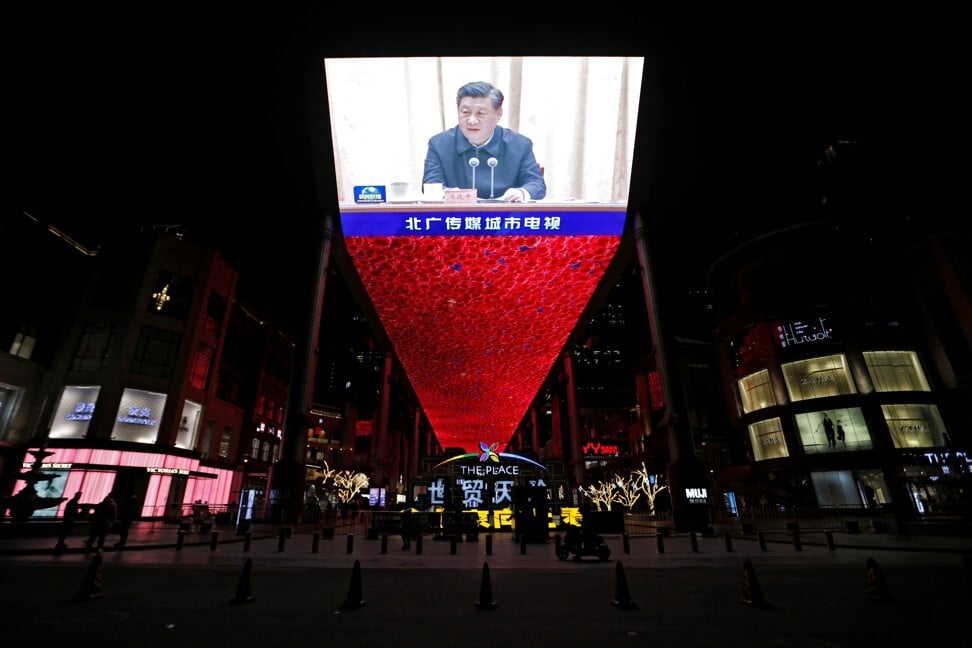
China’s internet was hailed as a path to democracy but the Communist Party reshaped it in its own image
- The internet age has brought a sense of community for Chinese citizens but also greater surveillance and more control for the party
- President Xi Jinping saw a need to control the power of the internet and a use for digital tools to take China’s message to the world
The Chinese government has made technology and innovation key priorities in its development plans for the next five years, as it strives to build a “Digital China” and overtake the US as the world’s No 1 economy. In this first part of a series looking at the politicisation of China’s internet landscape, we explain how the Communist Party gained and retained a tight grip on the online sphere, defying early expectations from the West.
“There’s no question China has been trying to crack down on the internet,” he said. “Good luck. That’s sort of like trying to nail Jell-O to the wall.”
There were 22.5 million internet users in China in early 2001. By last year, that figure had ballooned to 989 million – more than three times the entire population of the United States and exceeding the 639 million internet users in India, according to the state-run China Internet Network Information Centre.
And “nailing Jell-O to the wall” is something the nation, which now accounts for about a fifth of the world’s internet users, seems to have excelled in.
In January, the party published a book of remarks Xi had made since 2013 about the internet, highlighting China’s “historic achievements” in cyberspace administration and development and claiming that the internet was bringing an “unprecedented impact on sovereignty and security”.
How China’s internet giants have failed the country’s youth
With more than 70 per cent of China’s 1.4 billion people relying on the internet for work, consumption and entertainment, the government has vowed to increase people’s “sense of fulfilment, happiness and security” by providing a high-quality internet service and becoming a cyberpower by 2035.
Ultimately, China will become a country with “advanced technologies, a developed internet industry and indestructible cybersecurity which is good at attack and defence, and with strong internet governance capability”, Zhuang Rongwen wrote in the latest issue of Communist Party journal Qiushi .
Zhuang is deputy director of the party’s publicity department and head of the Cyberspace Administration of China.
“Very few ruling parties in the world are as active as the Communist Party of China in adapting to the information revolution trend and emphasising the development and governance of internet,” he said.
“Very few country leaders are as sensitive and insightful as President Xi, who has a sober understanding and thorough thinking of the internet.”

Adam Segal, director of the digital and cyberspace policy programme at New York-based think tank, the Council on Foreign Relations, said: “When Beijing talks about becoming a cyberpower, it is referring to domestic regulatory capability, technological autonomy and the ability to shape the global governance of cyberspace. It has made progress on all these fronts.
“Compared to a decade ago, when they felt under attack, Chinese leaders must now believe that they will continue to be able to shape the internet to their interests,” he said.
“It developed a combination of regulation, repression and technology that not only effectively controlled the flow of information but also prevented netizens from using the web to organise protests.”
The Chinese leadership went further to argue that national governments had the ultimate right to control the internet within their borders, trying to silence criticism from the West. Addressing the 2015 World Internet Conference in Wuzhen, in eastern Zhejiang province, Xi promoted what he called “cyber sovereignty”. He asserted that individual countries should have the right to “independently choose their own path of cyber development, model of cyber regulation and internet public policies”.
China’s cyber sovereignty efforts have both domestic and international components and will result in an internet that will be less open and free, according to Segal, reflecting a widespread disillusionment with the spread of disinformation, threats to privacy and the concentration of economic and political power by big technology firms.
Chen Daoyin, an independent political analyst and former Shanghai University professor, said the outcome of the internet tussle between China and the West exemplified that “openness can be penetrated, modified and even replaced by closeness”.
“While two decades ago the US and other Western countries had a Chinese dream – accepting and integrating with China to make it change – China’s practices had crashed the dream,” he said.
“That follows the logic of competition between open and closed societies which has been repeated many times in world history and China’s history. The closed society remains unchanged, undefeated, withstanding attempts from the open society to challenge it.”
The biggest beneficiary is the party, as it uses the internet to impose much tighter control and surveillance of the Chinese people wherever they are
Steve Tsang, director of the SOAS China Institute at the University of London, said the Communist Party used the internet to defend its “anti-democratic system” by tightly controlling it.
“There is no doubt that despite all the restrictions and controls on the internet imposed by the Chinese state, ordinary people in China [are] empowered in commercial and social terms by the internet, at least in the sense of what they can do now that they could not in the pre-internet era,” he said.
“However, the biggest beneficiary is the party, as it uses the internet to impose much tighter control and surveillance of the Chinese people wherever they are, in a way that was unthinkable in the pre-internet era without reintroducing a full old-fashioned totalitarian system.”
LGBT groups panic as China tightens rules on internet publishing
And at the height of the Covid-19 outbreak, people under lockdown and lacking essential foods exposed their plight in social media posts to get aid and support from the government and society.
There have also been instances of officials being investigated, or even punished, after online exposure about their excessive wealth or corrupt lifestyle caused a sensation.
In a speech in 2013, Xi articulated his vision: “The internet has become the main battlefield for the public opinion struggle.”
He urged cadres to “occupy the battlefield” – keeping and expanding the “red zones” consisting of mainstream media and “positive voices”, fighting with the “black camp” of negative voices and hostile forces, and turning those in the “grey zones” to red.
The party has mobilised a large number of officials and cadres to censor online content and write comments. It has been frequently reported that the government paid people to censor or steer public opinion. This widespread belief led to the coining of the expression wumao or “50 cent trolls” but many of the online army’s latest recruits are young, passionate, patriotic, vocal and, they insist, unpaid, sources said.
Baidu, Alibaba, Tencent score low in digital rights protection
To make China a cyber superpower, Xi has emphasised strengthening technology research to overcome bottlenecks, as well as to foster and attract talent. And teachers play an important part in ensuring the younger generation that will help shape the future of the internet are ideologically aligned with party thinking.
“No matter whether the subject is radio electronics or blockchain technology, we are required to embody the party’s values in the daily teaching,” Zeng Liaoyuan, an associate professor of information and communication engineering at the University of Electronic Science and Technology of China, said.
“The future will be decided by whether China can create a stable and prosperous environment and whether it can successfully attract high-end talent to come to China,” he said.
But for many people, any concerns about how content on the internet could be shaped or filtered by political forces are secondary to its entertainment value. Tang Feng, a 32-year-old food delivery worker, said that other than the fact that his job relied on the internet – which facilitates everything from receiving food orders to navigating to restaurants – he watched “funny videos” on his phone to pass the time between deliveries.
“I’m on call 12 hours a day. Without the internet, I’d be killed by the boredom,” he said. “It’s good enough to have a portable entertainment device. I can’t imagine anything better.”




